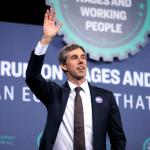
Source: Wikimedia
I confess before God and you, my brothers and sisters, that I have gravely sinned. I have sinned! Like the Witch of Endor, my wife and I conjured up a shade from the great beyond, a specter whose place in 2023 is—I see now—ill-advised. Between puppy energy bursts and our yowling cat (he’s named Crybaby for a reason), we traipsed about Netflix, willy-nilly scanning each little rectangle until there it was: 2017’s Nobody Speak: Trials of the Free Press. We didn’t notice the title. We, rather, saw Hulk Hogan and Gawker. Trashy? Probably, but that was what we needed, and if it taught us something—no complaints.
Missing the title was bad enough, but our not looking at the documentary’s year of release was fatal. This didn’t become all that obvious at first, but when it did, I was prepared to face King Saul’s fate. Fall on my sword? I deserved worse.
Ostensibly, this Brian Knappenberger picture covers the famous Hulk Hogan sex tape trial. This accounts for roughly 50-60 minutes of the film and, contrary to what I imply above, is competently done and kept our attention. You can’t go wrong with a shock jock called Bubba the Love Sponge who lets his best friend, Terry Bollea (Hogan), have sex with his wife while he tapes it. That’s Florida for you. The filmmakers make ample and funny use of trial recordings, which is a delight (everyone involved is, in some sense, an entertainer, so there’s always something to laugh or jeer at). Among my favorite court moments shows the wrestler on the stand arguing that the things he says in the Gawker-released tape cannot be taken as the words of Terry Bollea. At the time (that is, just after sex) he was in character as HH. When a lawyer asks him, then, if he, as stated in the video, has a 10-inch penis, he replies that he does not. Hulk Hogan does.
It’s not all fun and games though. Indeed, the film’s first section is informative, depressingly so at times. Interviews and court documents reveal the ways in which the deck was stacked against Gawker’s team (not allowing certain evidence, for example). Hogan drops one charge, which takes the website’s insurance out of the equation, leaving the journalists unprotected, potentially liable, and, in the case of Gawker’s founder, eventually bankrupt. Totaling well over $100 million, the damages exceed (as several experts tell us) anything normally seen in these situations by orders of magnitude—that much for invasion of privacy. Perhaps worst of all, we learn (as is now common knowledge) that Bollea’s legal fees were essentially paid by Silicon Valley billionaire and right-wing enfant terrible, Peter Thiel, who (for any number of reasons) took the opportunity to settle a grudge against Gawker. Talking heads inform us that, while the robber barons owned newspapers and planted stories, this was new territory—an oligarch using cat’s paws to level much-smaller enemies in court.
Sure, there’s the occasional stylistic oddity (the introduction of transitional title cards halfway into the movie, for instance). But this part of the effort is worth the price of admission (or a Netflix subscription). The first, rather benign, sign that something is amiss arrives when we learn about Bollea’s racist rant captured on the tape. Knappenberger and his team gained access to FBI-redacted recordings of Hogan and his lawyer going through the full filmed escapade with agents from the Bureau (Gawker had only released clips. A shady entertainment lawyer from LA had the actual original and got caught trying to extort Bollea). It’s Hogan’s reaction that felt off. As you might expect, he’s annoyed that, should this come out, it’ll make him look even worse. But there’s no immediate hint of regret, even if only to save face in front of his lawyer and the FBI.
“Okay,” I thought, “maybe his public statement once the tape is out will be different.” Not quite. Bollea’s apology does say it was wrong, but it just doesn’t sound like a contemporary response to public allegations of misconduct. These things now, whether prepared by lawyers or not, have a very careful tone and specific diction. Terms and phrases like “accountability” and “working on myself” come up a lot. If even a “dirtbag Left” type like Andrew Callaghan can release a statement so clearly translated from this HR speak, then anyone, even Hulk Hogan, can. What the heck is going on here?
It would take the rest of the movie for me to be certain, but I started asking my wife when she thought this was made. With all the animal interruptions, we never settled on an answer. The movie’s next pivot clarified things a little, however. The final third or so discusses the case of the Las Vegas Review-Journal, how it was purchased in 2015 by a secret group of investors who sent in, as the movie makes clear, a front man straight out of central casting. Behind this unexpected move is, we learn, Sheldon Adelson, a local billionaire with a history of feuding with the newspaper. Stories of personal and professional integrity follow as the Review-Journal’s reporters get to the bottom of the purchase and then resign en masse.
It’s a worthwhile story, but what the heck was it doing here? Where were Hulk and Bubba? Whither the biting Gawker headlines? At first, I figured that Adelson must have been pulling a Thiel by way of ownership—bleed the thing dry, corporate raider-style. But no. He seems to remain in the background. It can’t just be that he bought a newspaper. The documentary was at pains earlier to communicate that oligarchs have always influenced media, but that Thiel’s shadowy litigiousness was new.
Then it arrived, the nightmarish answer to my puzzlement. The final 10 minutes or so build into a kind of sentimentalism only possible when this film was released: June 24, 2017. Credit where it’s due, the pivot is subtle; we ease from a specific story of journalistic heroism in the Las Vegas case into this paean to the brave troops on the frontlines of the information war. Patriotic music swells as clips from CNN and MSNBC announce their dogged opposition to Trump. They name scandals long since forgotten in the turmoil since. Talking heads swear allegiance to nothing but the facts. At one point, a woman’s voice (one we have not yet heard, not is it ever explained—the rest of the documentary has no narrator) interrupts this swell of journalistic pride to read some sort of sacred oath. That’s really the only way I can describe it; it had the earnestness and passion (if not the informality) of John Brown on the way to the gallows. We end with a Thomas Jefferson quote tying the possibility of liberty to a free press.
Here’s the thing: I’m not a Trump fan. I do think a free press is key to a properly democratic society. Journalists do sometimes challenge power; we need more investigative and other reporters like Seymour Hersh, Gary Webb, Michael Hastings, and Alexandra Scaggs. Good reporting shines in both big and little things. But the media, whether because of corporate meddling or some other reason, has many a skeleton in its closet (just ask Gary Webb after your own Witch of Endor-style ritual). The movie acknowledges this with one sentence about the press having to take its failures seriously. But how can that vaguery be enough? In 2016, people felt distrustful of the media and government for a reason. From stooge-like reporting during the Tonkin Gulf Incident to pro-invasion of Iraq cheerleading and intelligence laundering, the modern press has a lot to answer for—again, both big and small.
We seem to have settled down some now, with journalism back as one profession among many, rather than the holiest office attainable by man. I’m not sure the media ever really reckoned with its past—many a journalist and editor who, for example, pushed the Iraq invasion has remained where they were or moved up in the chain of command. That’s a shame. But it’s less a shame without that now-bygone piety that saturated 2017. It was truly a different world. So, if you decide to check out Nobody Speak, maybe stop conjuring during the Las Vegas bit. The ghosts at the end will haunt you for days.













